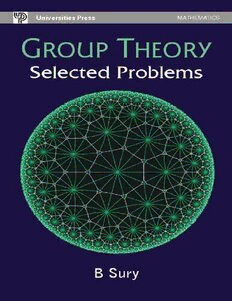Table Of ContentGroup eory
Selected Problems
B. Sury
For our entire range of books please use search strings "Orient BlackSwan",
"Universities Press India" and "Permanent Black" in store.
Universities Press (India) Private Limited
Registered Office
3-6-747/1/A & 3-6-754/1, Himayatnagar, Hyderabad 500 029 (A.P.), INDIA
e-mail: info@universitiespress.com
Distributed by
Orient Blackswan Private Limited
Registered Office
3-6-752 Himayatnagar, Hyderabad 500 029 (A.P.), INDIA
e-mail: info@orientblackswan.com
Other Offices
Bangalore, Bhopal, Bhubaneshwar, Chennai,
Ernakulam, Guwahati, Hyderabad, Jaipur, Kolkata,
Lucknow, Mumbai, New Delhi, Noida, Patna
© Universities Press (India) Private Limited 2004
First published 2004
eISBN 9978 81 7371 893 9
e-edition:First Published 2013
ePUB Conversion: Techastra Solutions Pvt. Ltd.
All rights reserved. No part of this publication may be reproduced,
distributed, or transmitted in any form or by any means, including
photocopying, recording, or other electronic or mechanical methods,
without the prior written permission of the publisher, except in the case of
brief quotations embodied in critical reviews and certain other
noncommercial uses permitted by copyright law. For permission requests
write to the publisher.
"It is not knowledge, but the act of learning, not possession but the act of
getting there, which grants the greatest enjoyment. When I have clarified
and exhausted a subject, then I turn away from it, in order to go into
darkness again; the never-satisfied man is so strange if he has completed a
structure, then it is not in order to dwell in it peacefully, but in order to
begin another. I imagine the world conqueror must feel thus, who, aer one
kingdom is scarcely conquered, stretches out his arms for others."
C.F. Gauss in a letter to Bolyai in 1808
When Horn becomes and life seems drab and dreary, join the club of
⊗
problem-solvers in group theory!
My group could be a-belian; what is a mere million?
Isomorphic copics could havc hucs of a chamclcon!
My matrices – my dear Homs – are oen elementary.
In such a case, the group can even have the center {e).
Aut I convince any more ? Life's normally N or G!
Contents
Preface
Acknowledgements
Examples and Notations
Problems
Solutions
Bibliography
Preface
ese are problems which the author has callected over two decades. e
problems are principally aimed at undergraduate mathematics honours
students, but the author expects many of them would be useful even for
beginning graduate students. Excepting a few preliminary ones, we have
included only problems which are not found in standard texts of Artin,
Fraleigh, Herstein, Hungerford and Lang. ese problems are meant only to
supplement the existing ones in them and not to substitute for them. e
author wishes to acknowledge the enormous pleasure he has derived from
two textbooks one, the wanderful graduate text A course in the eory of
‐
Groups by D. J. S. Robinson and the other e eory of Groups by I. D.
Macdonald. Only abstract groups are discussed here although many
problems on finite groups here can be stated at least for profinite groups. A
glaring omission (and perhaps a big disappointment to some readers) is of
problems in representations of finite groups. On the one hand, many
interesting or useful problems involving representation theory require a
knowledge of semisimple rings and modules, and concepts like tensor
products etc. On the other hand, the author believes that problems involving
representations of finite groups alone require a separate manuscript whose
size would go beyand the rest of the topics. As a result, the author has
decided, albeit grudgingly, to stick only to some basic problems on
representations which involve only linear algebra. Aiso, though we have
included a few problems on free groups, we have not really gone into
combinatorial group theory. Problems involving wreath products and HNN
extensions, etc. are aiso not discussed. e problems are interspersed with
comments putting them in perspective with other problems and with the
subject itself. We have adopted a convention whereby we have separated the
problems into two categories –S and N– which indicate whether they are
standard or not. By standard, we do not mean easy problems but we mean
problems which appear in some advanced text as a theorem perhaps. e
intention of this problem book is two fold; on the one hand, to reinforce the
‐
existent knowledge by solving new problems and, on the other hand, to
introduce some concepts not usually taught at this level, by means of what
we have called standard problems. A final word on acknowledging the
source of the problems we have mentioned the names of people to whom
‐
the result is due. However, these problems have been callected over many
years and it has not been always possible to locate a reference where it has
appeared either as a theorem or a problem etc. erefore, rather than
mention only those references which are known to the author, we adopt the
policy of not mentioning a reference but only the name in each case.
Acknowledgements
Over the years, D. S. Nagaraj, Dipendra Prasad, Raja Sridharan, Ravi Rao,
Amit Roy and T. N. Venkataramana have been some people with whom I
have shared the enthusiasm of encountering these types of problems and
solving them. I have aiso enjoyed and benefitted from the works of A.
Lubotzky, A. Mann, A. Shalev and L. Pyber for their group theoretic
‐
essence.

